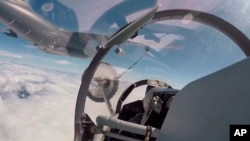Taiwan’s National Defense Ministry has started sharing more information about Chinese military activities as incursions into its airspace hit a record high of 300 flights in August, according to publicly available data.
Since 2020, Taiwan’s military has shared information about Chinese aircraft that fly into its air defense identification zone, which includes Taiwanese and Chinese land and maritime territory. Flights have ranged from a handful per week to dozens a day during tense periods.
The military tracked 444 flights in the ADIZ in August alone, more than twice the previous record of 196 flights set last October, according to public information compiled by the Taiwan ADIZ Violations Tracker database.
More alarming for Taiwan is the escalation of flights into its airspace, defined as the east side of an imaginary “median line” dividing the Taiwan Strait in two. The Chinese military made only 23 total incursions across the median line between September 2020 and the end of July 2022, according to public data, compared to August’s 300 flights.
The median line has long been seen as a way to avoid conflict, but China has begun whittling away at it Bonnie Glaser, director of the Asia Program at the German Marshall Fund of the United States, told VOA by email.
“The PRC has erased the center line of the Strait. Navy ships and aircraft are flying over it virtually every day. They are seeking wear down Taiwan's pilots and maintenance crews and instill a sense of psychological despair among the population,” Glaser said.
Glaser said China will likely continue more exercises with the goal of “narrowing Taiwan's operating space and calling into question its claim to an ADIZ and an [exclusive economic zone].”
The shift follows several days of large-scale Chinese military exercises around Taiwan from August 4 to 7 following a controversial visit to Taipei by U.S. House Speaker Nancy Pelosi.
Pelosi was the highest-ranking official to visit Taiwan since then-House Speaker Newt Gingrich visited in 1997. Her trip was heavily criticized by Beijing, which regards the self-ruling democracy as its territory.
Crystal Chen-yi Tu, an assistant research fellow at Taiwan’s Institute for National Defense Research, told VOA China may be using Pelosi’s trip as an excuse to fulfill a long-term goal to extend their military training exercises.
“Regardless of whether Pelosi visited or not, they would always try to find another excuse, so it was always going to happen, but it looked like Pelosi was the trigger,” Tu said. “In fact, China has this planning this idea for a while so that’s what why we see an increase in regular aircraft in the ADIZ.”
Taiwan’s military is not required by law to disclose all Chinese activity, so it is possible that more incursions have happened in the past, unknown to the public, said Wen-ti Sung, a political scientist at Australian National University’s Taiwan Studies Program.
“There are good reasons why government may choose not to disclose or disclose in full, because it may be potentially escalatory, forcing our side to also escalate,” he told VOA by phone. Sharing information could also tip Taiwan’s military intelligence hand, he said.
Since early August, however, the National Defense Ministry has begun sharing more detailed daily descriptions of Chinese air and sea activity around its territory. including total number of aircraft in the vicinity and median line violations.
Sung said the change follows public backlash in Taiwan against the military for failing to disclose that China had fired missiles over the island during the August exercises. The information was later reported by media in Japan.
Many in Taiwan thought the military was trying to be too careful, he said.
Similar changes included a major policy overhaul at the end of August to now shoot down unidentified drones that fly into Taiwanese airspace and do not respond to warnings. The decision follows a widely shared video of Taiwanese soldiers were filmed throwing rocks at a Chinese drone flying over the outlying island of Kinmen.









